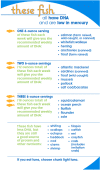A pilot randomized controlled trial to promote healthful fish consumption during pregnancy: the Food for Thought Study
- PMID: 23496848
- PMCID: PMC3616846
- DOI: 10.1186/1475-2891-12-33
A pilot randomized controlled trial to promote healthful fish consumption during pregnancy: the Food for Thought Study
Abstract
Background: Nutritionists advise pregnant women to eat fish to obtain adequate docosahexaenoic acid (DHA), an essential nutrient important for optimal brain development. However, concern exists that this advice will lead to excess intake of methylmercury, a developmental neurotoxicant.
Objective: Conduct a pilot intervention to increase consumption of high-DHA, low-mercury fish in pregnancy.
Methods: In April-October 2010 we recruited 61 women in the greater Boston, MA area at 12-22 weeks gestation who consumed <=2 fish servings/month, and obtained outcome data from 55. We randomized participants to 3 arms: Advice to consume low-mercury/high-DHA fish (n=18); Advice + grocery store gift cards (GC) to purchase fish (n=17); or Control messages (n=20). At baseline and 12-week follow-up we estimated intake of fish, DHA and mercury using a 1-month fish intake food frequency questionnaire, and measured plasma DHA and blood and hair total mercury.
Results: Baseline characteristics and mean (range) intakes of fish [21 (0-125) g/day] and DHA from fish [91 (0-554) mg/d] were similar in all 3 arms. From baseline to follow-up, intake of fish [Advice: 12 g/day (95% CI: -5, 29), Advice+GC: 22 g/day (5, 39)] and DHA [Advice: 70 mg/d (3, 137), Advice+GC: 161 mg/d (93, 229)] increased in both intervention groups, compared with controls. At follow-up, no control women consumed >= 200mg/d of DHA from fish, compared with 33% in the Advice arm (p=0.005) and 53% in the Advice+GC arm (p=0.0002). We did not detect any differences in mercury intake or in biomarker levels of mercury and DHA between groups.
Conclusions: An educational intervention increased consumption of fish and DHA but not mercury. Future studies are needed to determine intervention effects on pregnancy and childhood health outcomes.
Trial registration: Registered on clinicaltrials.gov as NCT01126762.
Figures



References
-
- Nesheim M. Yaktine A (eds.): Seafood Choices: Balancing benefits and risks. Washington, DC: The National Academies Press; 2007.
-
- Koletzko B, Cetin I, Thomas Brenna J. Dietary fat intakes for pregnant and lactating women. Br J Nutr. 2007;98(5):873–877. - PubMed
-
- Goyer R, Aposhian V, Arab L, Bellinger D, Burbacher T, Burke T, Jacobson J, Knobeloch L, Stern A, Ryan L. Toxicological effects of methylmercury. Washington, D.C.: National Academy Press; 2000.
Publication types
MeSH terms
Substances
Associated data
Grants and funding
LinkOut - more resources
Full Text Sources
Other Literature Sources
Medical
Miscellaneous

